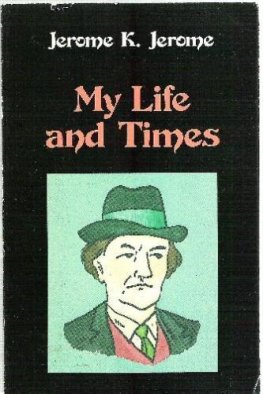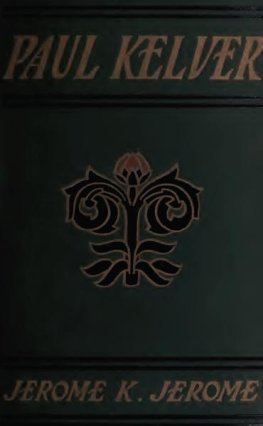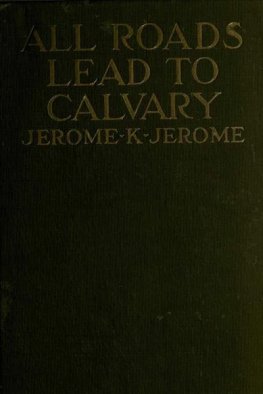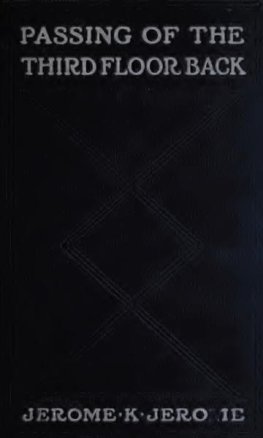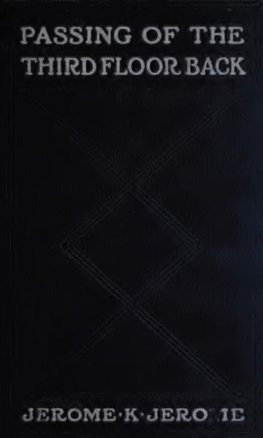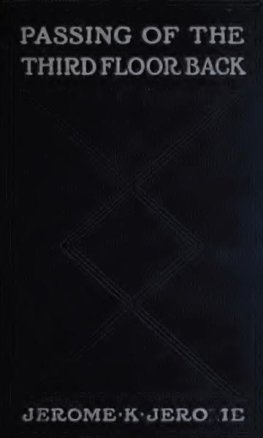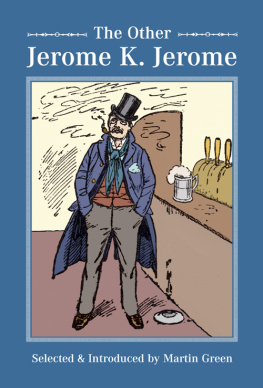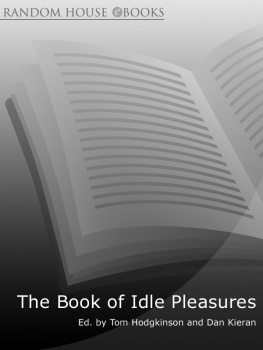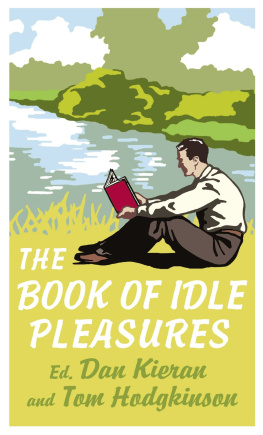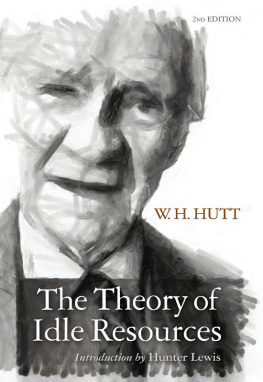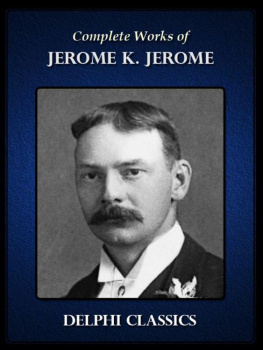Jerome K. Jerome
Idle Thoughts of an Idle Fellow
Now, this is a subject on which I flatter myself I really am au fait. The gentleman who, when I was young, bathed me at wisdom's font for nine guineas a termno extrasused to say he never knew a boy who could do less work in more time; and I remember my poor grandmother once incidentally observing, in the course of an instruction upon the use of the Prayer-book, that it was highly improbable that I should ever do much that I ought not to do, but that she felt convinced beyond a doubt that I should leave undone pretty well everything that I ought to do.
I am afraid I have somewhat belied half the dear old lady's prophecy. Heaven help me! I have done a good many things that I ought not to have done, in spite of my laziness. But I have fully confirmed the accuracy of her judgment so far as neglecting much that I ought not to have neglected is concerned. Idling always has been my strong point. I take no credit to myself in the matterit is a gift. Few possess it. There are plenty of lazy people and plenty of slow-coaches, but a genuine idler is a rarity. He is not a man who slouches about with his hands in his pockets. On the contrary, his most startling characteristic is that he is always intensely busy.
It is impossible to enjoy idling thoroughly unless one has plenty of work to do. There is no fun in doing nothing when you have nothing to do. Wasting time is merely an occupation then, and a most exhausting one. Idleness, like kisses, to be sweet must be stolen.
Many years ago, when I was a young man, I was taken very illI never could see myself that much was the matter with me, except that I had a beastly cold. But I suppose it was something very serious, for the doctor said that I ought to have come to him a month before, and that if it (whatever it was) had gone on for another week he would not have answered for the consequences. It is an extraordinary thing, but I never knew a doctor called into any case yet but what it transpired that another day's delay would have rendered cure hopeless. Our medical guide, philosopher, and friend is like the hero in a melodramahe always comes upon the scene just, and only just, in the nick of time. It is Providence, that is what it is.
Well, as I was saying, I was very ill and was ordered to Buxton for a month, with strict injunctions to do nothing whatever all the while that I was there. "Rest is what you require," said the doctor, "perfect rest."
It seemed a delightful prospect. "This man evidently understands my complaint," said I, and I pictured to myself a glorious timea four weeks' dolce far niente with a dash of illness in it. Not too much illness, but just illness enoughjust sufficient to give it the flavor of suffering and make it poetical. I should get up late, sip chocolate, and have my breakfast in slippers and a dressing-gown. I should lie out in the garden in a hammock and read sentimental novels with a melancholy ending, until the books should fall from my listless hand, and I should recline there, dreamily gazing into the deep blue of the firmament, watching the fleecy clouds floating like white-sailed ships across its depths, and listening to the joyous song of the birds and the low rustling of the trees. Or, on becoming too weak to go out of doors, I should sit propped up with pillows at the open window of the ground-floor front, and look wasted and interesting, so that all the pretty girls would sigh as they passed by.
And twice a day I should go down in a Bath chair to the Colonnade to drink the waters. Oh, those waters! I knew nothing about them then, and was rather taken with the idea. "Drinking the waters" sounded fashionable and Queen Anne-fied, and I thought I should like them. But, ugh! after the first three or four mornings! Sam Weller's description of them as "having a taste of warm flat-irons" conveys only a faint idea of their hideous nauseousness. If anything could make a sick man get well quickly, it would be the knowledge that he must drink a glassful of them every day until he was recovered. I drank them neat for six consecutive days, and they nearly killed me; but after then I adopted the plan of taking a stiff glass of brandy-and-water immediately on the top of them, and found much relief thereby. I have been informed since, by various eminent medical gentlemen, that the alcohol must have entirely counteracted the effects of the chalybeate properties contained in the water. I am glad I was lucky enough to hit upon the right thing.
But "drinking the waters" was only a small portion of the torture I experienced during that memorable montha month which was, without exception, the most miserable I have ever spent. During the best part of it I religiously followed the doctor's mandate and did nothing whatever, except moon about the house and garden and go out for two hours a day in a Bath chair. That did break the monotony to a certain extent. There is more excitement about Bath-chairingespecially if you are not used to the exhilarating exercisethan might appear to the casual observer. A sense of danger, such as a mere outsider might not understand, is ever present to the mind of the occupant. He feels convinced every minute that the whole concern is going over, a conviction which becomes especially lively whenever a ditch or a stretch of newly macadamized road comes in sight. Every vehicle that passes he expects is going to run into him; and he never finds himself ascending or descending a hill without immediately beginning to speculate upon his chances, supposingas seems extremely probablethat the weak-kneed controller of his destiny should let go.
But even this diversion failed to enliven after awhile, and the ennui became perfectly unbearable. I felt my mind giving way under it. It is not a strong mind, and I thought it would be unwise to tax it too far. So somewhere about the twentieth morning I got up early, had a good breakfast, and walked straight off to Hayfield, at the foot of the Kinder Scouta pleasant, busy little town, reached through a lovely valley, and with two sweetly pretty women in it. At least they were sweetly pretty then; one passed me on the bridge and, I think, smiled; and the other was standing at an open door, making an unremunerative investment of kisses upon a red-faced baby. But it is years ago, and I dare say they have both grown stout and snappish since that time. Coming back, I saw an old man breaking stones, and it roused such strong longing in me to use my arms that I offered him a drink to let me take his place. He was a kindly old man and he humored me. I went for those stones with the accumulated energy of three weeks, and did more work in half an hour than he had done all day. But it did not make him jealous.
Having taken the plunge, I went further and further into dissipation, going out for a long walk every morning and listening to the band in the pavilion every evening. But the days still passed slowly notwithstanding, and I was heartily glad when the last one came and I was being whirled away from gouty, consumptive Buxton to London with its stern work and life. I looked out of the carriage as we rushed through Hendon in the evening. The lurid glare overhanging the mighty city seemed to warm my heart, and when, later on, my cab rattled out of St. Pancras' station, the old familiar roar that came swelling up around me sounded the sweetest music I had heard for many a long day.
I certainly did not enjoy that month's idling. I like idling when I ought not to be idling; not when it is the only thing I have to do. That is my pig-headed nature. The time when I like best to stand with my back to the fire, calculating how much I owe, is when my desk is heaped highest with letters that must be answered by the next post. When I like to dawdle longest over my dinner is when I have a heavy evening's work before me. And if, for some urgent reason, I ought to be up particularly early in the morning, it is then, more than at any other time, that I love to lie an extra half-hour in bed.


